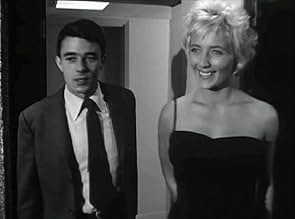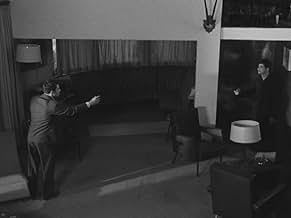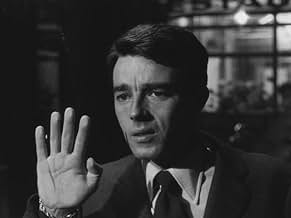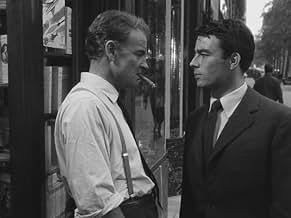VALUTAZIONE IMDb
7,2/10
3418
LA TUA VALUTAZIONE
Aggiungi una trama nella tua linguaA pair of cousins share a flat, but animosity begins to build between the two when a woman gets involved.A pair of cousins share a flat, but animosity begins to build between the two when a woman gets involved.A pair of cousins share a flat, but animosity begins to build between the two when a woman gets involved.
- Regia
- Sceneggiatura
- Star
- Premi
- 1 vittoria in totale
Recensioni in evidenza
This film by Claude Chabrol reminds me of the old story of the country mouse and the city mouse. The country mouse is excited to see the big city but his bumbling provincial ways are out of step with his more sophisticated city cousin. This seems to be pretty much the basis for this film, "Les Cousins"! Though of course, being a Chabrol film it will have some dark edges and twists!
Charles is the guy raised in the country. He's slow and lacks confidence with women. Paul, on the other hand, was raised in the city and women hang all over him and put out like crazy for him. When Charles comes to stay with him while he goes to college, he is quite the contrast to Paul who is a confident ladies' man. He's also more bookish and introspective than Paul. All Paul wants is to have a good time and have sex--and he couldn't care less about his studies at the college. And, in a way, Paul has contempt for his cousin when Charles falls head over heels for Florence--and he soon beds Florence and asks her to move in with him. As for Charles, he is sad but sinks his energy into his classwork and tries to do the right thing. What's next for this odd mismatched pair? Bet you won't be able to guess!
This film is considered by many to be one of the best and earliest New Wave films. Like many New Wave movies, the normal film formulas are turned on their head and goodness isn't necessarily rewarded and the ending is quite ambiguous. Well worth seeing and darkly enjoyable.
Charles is the guy raised in the country. He's slow and lacks confidence with women. Paul, on the other hand, was raised in the city and women hang all over him and put out like crazy for him. When Charles comes to stay with him while he goes to college, he is quite the contrast to Paul who is a confident ladies' man. He's also more bookish and introspective than Paul. All Paul wants is to have a good time and have sex--and he couldn't care less about his studies at the college. And, in a way, Paul has contempt for his cousin when Charles falls head over heels for Florence--and he soon beds Florence and asks her to move in with him. As for Charles, he is sad but sinks his energy into his classwork and tries to do the right thing. What's next for this odd mismatched pair? Bet you won't be able to guess!
This film is considered by many to be one of the best and earliest New Wave films. Like many New Wave movies, the normal film formulas are turned on their head and goodness isn't necessarily rewarded and the ending is quite ambiguous. Well worth seeing and darkly enjoyable.
The naive mama's boy Charles (Gérard Blain) moves to Paris to live with his debauched bon-vivant cousin Paul Thomas (Jean-Claude Brialy) in his apartment. He meets Paul's friend, the pervert pimp Jean "Clovis", who is older than them. Paul studies hard and writes daily to his mother while Paul gives frequent parties and neither studies nor goes to lectures. When Charles meets Paul's friend, the gorgeous and promiscuous Florence (Juliette Mayniel), he falls in love with her. They talk later through telephone and Florence understands the invitation of Charlie to meet her wrongly and arrives earlier at his apartment. She meets the cynical Paul and Clovis that tell her that she is a slut and will cheat Charlie when she becomes bored with him, and she ends having sex with Paul. Florence moves to the apartment to live with Paul, disturbing the attention of Charlie in his studies. When the final exams come, there is a tragedy.
"Les cousins" (1959) is the second film directed by Claude Chabrol, with the story of two cousins and depicting an empty generation. One cousin is from the countryside, naive, shy and mama's boy; the other is popular and pervert, although protecting his cousin most of the time. The beautiful Juliette Mayniel performs a key element in the story, since Charles has a crush on her, but Paul destroys their relationship since the twenty-year-old woman is promiscuous and has slept with most of his friends. However, the concentration of Charles is lost, and he fails his exam. The tragic conclusion is very sad. My vote is seven.
Title (Brazil): "Os Primos" ("The Cousins")
"Les cousins" (1959) is the second film directed by Claude Chabrol, with the story of two cousins and depicting an empty generation. One cousin is from the countryside, naive, shy and mama's boy; the other is popular and pervert, although protecting his cousin most of the time. The beautiful Juliette Mayniel performs a key element in the story, since Charles has a crush on her, but Paul destroys their relationship since the twenty-year-old woman is promiscuous and has slept with most of his friends. However, the concentration of Charles is lost, and he fails his exam. The tragic conclusion is very sad. My vote is seven.
Title (Brazil): "Os Primos" ("The Cousins")
Charles is a young provincial coming up to Paris to study law. He shares his cousin Paul's flat. Paul is a kind of decadent boy, a disillusioned pleasure-seeker, always dragging along with other idles, while Charles is a plodding, naive and honest man. He fell in love with Florence, one of Paul's acquaintances. But how will Paul react to that attempt to build a real love relationship?
Of the so-called French New Wave directors, Claude Chabrol has been called possibly the most mainstream (though less celebrated than Truffaut or Godard). We could also say he has a remarkable amount of stamina. "Les Cousins" was at the beginning of his career, and for decades he kept making great movies, including the notable "Madame Bovary" in 1991... and still kept going.
I love this film's blend of decadence and death. A simple man, with studies on his mind, is exposed to some bizarre scenes of sensuality, violence, crime, and even Nazi elements (in 1950s France?). This is what it is like if you take two opposing elements and allow them to spin out of control.
Of the so-called French New Wave directors, Claude Chabrol has been called possibly the most mainstream (though less celebrated than Truffaut or Godard). We could also say he has a remarkable amount of stamina. "Les Cousins" was at the beginning of his career, and for decades he kept making great movies, including the notable "Madame Bovary" in 1991... and still kept going.
I love this film's blend of decadence and death. A simple man, with studies on his mind, is exposed to some bizarre scenes of sensuality, violence, crime, and even Nazi elements (in 1950s France?). This is what it is like if you take two opposing elements and allow them to spin out of control.
Les Cousins is definitively part of the French New Wave of the late 1950s. Whilst slightly more polished than the films of his contemporaries (notably Godard and Truffaut), Chabrol's film bubbles with an insurgence of new cinematographic techniques and fresh acting talent. The sense of newness is reinforced by presence of so many young actors, dressed elegantly in tuxedos and evening dresses, but acting somewhat delinquently for the most part. The film appears almost like the christening party for the birth of a new era in French cinema.
Both the direction and photography are of a high calibre and capture very well the changing mood of the central character, Charles. The film starts cheerfully and optimistically with the young man's arrival in Paris. Like him, we are enchanted by the bright lights, the wide boulevards and the historic monuments. But then, little by little, the mood changes to ennui and disappointment when the shallowness of the Paris jet set is revealed. Finally, a much darker mood prevails as Charles' best efforts to succeed are brutally crushed by a combination of circumstances, partly of his own making but largely as a result of the hand of fate. This ability to alter the mood of the film so subtly and effectively is one of Chabrol's great skills as a director and is used to far greater effect in some of his subsequent thrillers.
Both of the two central characters, Charles and Paul, are played admirably by Gérard Blain and Jean-Claude Brialy. Blain manages to capture the innocence of the outsider and offers a sympathetic and memorable performance. Brialy seems to revel in his role as the extravagant city student, hosting his parties with the gusto of a true bon-vivant, whilst exhibiting a more complicated and sensitive persona in his conversations with the characters Charles and Florence.
Both actors were used by Chabrol in an earlier film, Le Beau Serge, which, in some ways, is the mirror image of Les Cousins. In Le Beau Serge, Brialy played a city boy who returns to his home in a provincial town where he met up wih a childhood friend played by Blain. Brialy's character was the outsider and ultimately he was destroyed by his alien surroundings. In Les Cousins, the situation is cleverly reversed. Here, Blain's character is a country boy who joins Brialy in the city of Paris. It is Blain's character who is now the outsider, and who is finally destroyed by his unfamiliar environment. It is interesting to watch the two films back-to-back, to note the similarities and compare the differences. Both films seem to side with the outsider and condemn the society that rejects him, although it is perhaps disappointing that, in both cases, that the outsider is destroyed without having any significant impact on the society that crushed him. At least, in Le Beau Serge, the victim's fate was sealed by an altruistic desire to do some good for the community that rejected him, whereas in Les Cousins, the victim brought his destruction on himself by trying to attack the society he felt so repulsive.
Les Cousins lacks the emotional intensity of Le Beau Serge and appears in some places a little too stage-managed. (The ending is particularly stagy, but it works perfectly to the film's advantage.) On the plus side, Les Cousins benefits from a far superior musical score, a more interesting set of characters, and some impressive location filming in Paris. It is an engaging and accessible film which still appears fresh and vibrant.
Both the direction and photography are of a high calibre and capture very well the changing mood of the central character, Charles. The film starts cheerfully and optimistically with the young man's arrival in Paris. Like him, we are enchanted by the bright lights, the wide boulevards and the historic monuments. But then, little by little, the mood changes to ennui and disappointment when the shallowness of the Paris jet set is revealed. Finally, a much darker mood prevails as Charles' best efforts to succeed are brutally crushed by a combination of circumstances, partly of his own making but largely as a result of the hand of fate. This ability to alter the mood of the film so subtly and effectively is one of Chabrol's great skills as a director and is used to far greater effect in some of his subsequent thrillers.
Both of the two central characters, Charles and Paul, are played admirably by Gérard Blain and Jean-Claude Brialy. Blain manages to capture the innocence of the outsider and offers a sympathetic and memorable performance. Brialy seems to revel in his role as the extravagant city student, hosting his parties with the gusto of a true bon-vivant, whilst exhibiting a more complicated and sensitive persona in his conversations with the characters Charles and Florence.
Both actors were used by Chabrol in an earlier film, Le Beau Serge, which, in some ways, is the mirror image of Les Cousins. In Le Beau Serge, Brialy played a city boy who returns to his home in a provincial town where he met up wih a childhood friend played by Blain. Brialy's character was the outsider and ultimately he was destroyed by his alien surroundings. In Les Cousins, the situation is cleverly reversed. Here, Blain's character is a country boy who joins Brialy in the city of Paris. It is Blain's character who is now the outsider, and who is finally destroyed by his unfamiliar environment. It is interesting to watch the two films back-to-back, to note the similarities and compare the differences. Both films seem to side with the outsider and condemn the society that rejects him, although it is perhaps disappointing that, in both cases, that the outsider is destroyed without having any significant impact on the society that crushed him. At least, in Le Beau Serge, the victim's fate was sealed by an altruistic desire to do some good for the community that rejected him, whereas in Les Cousins, the victim brought his destruction on himself by trying to attack the society he felt so repulsive.
Les Cousins lacks the emotional intensity of Le Beau Serge and appears in some places a little too stage-managed. (The ending is particularly stagy, but it works perfectly to the film's advantage.) On the plus side, Les Cousins benefits from a far superior musical score, a more interesting set of characters, and some impressive location filming in Paris. It is an engaging and accessible film which still appears fresh and vibrant.
This is more akin to the recognizable style of the "Nouvelle Vague" (with one of the characteristics being an unduly harsh quality to the cinematography, typically a prerogative of the film noir genre) than Chabrol's previous (and first) film, HANDSOME SERGE (1958).
Interestingly, while it features the same two leads – Gerard Blain and Jean-Claude Brialy – their roles are practically reversed (with the former now ingenuous and the latter world-weary), and set this time around in Paris rather than the provinces. Incidentally, the film forms a trilogy of sorts with Chabrol's other tales of amoral youth, all stemming from the vitriolic pen of the ill-fated Paul Gegauff i.e. LES BONNES FEMMES (1960) and WISE GUYS (1961).
Unfortunately, I did not watch this in the most congenial atmosphere – being a recording off French TV with subtitles in that language (it is odd that such an essential piece in both the director's canon and the influential "New Wave" filmography seems to be otherwise unavailable!). Anyway, having sensed a nod to Fellini in Chabrol's THE CHAMPAGNE MURDERS (1967), I can see definite links with this earlier effort (especially Brialy interrupting a wild party at his flat with a candle-lit recital of an epic German poem) – and which actually predates a similar occurrence in LA DOLCE VITA (1960) itself!
The film is also notable for being Stephane Audran's first collaboration (out of a total of 23!) with Chabrol; though her role is secondary, and a sluttish one at that, the actress – with hair dyed blonde – manages to make an impression nevertheless (she obviously did on her director, since they would eventually be married until 1980). Actually, the leading lady here is doe-eyed Juliette Mayniel (soon to play an unwilling donor in Georges Franju's EYES WITHOUT A FACE [1960] – ironically, one of several distinguished native directors dismissed as archaic by Godard et al), not an actress usually attached to the "New Wave" movement but who acquits herself exceedingly well under the circumstances.
Other characters within the narrative include yet another ambiguous and, in this case, much older live-in figure (who also acts as a bad influence on the heroine) and a librarian harboring almost paternal feelings for Blain. The film's abrupt tragic ending, casually treated by the director and deemed pointless by some, would seem to be suggesting that the bustle of city life spells the death of innocence (especially for someone not attuned to its grinding pace).
P.S. With this, I concluded my nearly two-month tribute to the octogenarian French master that included 27 films (all of them being first viewings!) and I regret not having had more time to revisit some of his other work – particularly A' DOUBLE TOUR (1959), LES BONNES FEMMES, TEN DAYS WONDER (1971) and INNOCENTS WITH DIRTY HANDS (1975)! For the record, I intend to pursue a similar retrospective for Jean-Luc Godard, who will himself turn 80 next December
Interestingly, while it features the same two leads – Gerard Blain and Jean-Claude Brialy – their roles are practically reversed (with the former now ingenuous and the latter world-weary), and set this time around in Paris rather than the provinces. Incidentally, the film forms a trilogy of sorts with Chabrol's other tales of amoral youth, all stemming from the vitriolic pen of the ill-fated Paul Gegauff i.e. LES BONNES FEMMES (1960) and WISE GUYS (1961).
Unfortunately, I did not watch this in the most congenial atmosphere – being a recording off French TV with subtitles in that language (it is odd that such an essential piece in both the director's canon and the influential "New Wave" filmography seems to be otherwise unavailable!). Anyway, having sensed a nod to Fellini in Chabrol's THE CHAMPAGNE MURDERS (1967), I can see definite links with this earlier effort (especially Brialy interrupting a wild party at his flat with a candle-lit recital of an epic German poem) – and which actually predates a similar occurrence in LA DOLCE VITA (1960) itself!
The film is also notable for being Stephane Audran's first collaboration (out of a total of 23!) with Chabrol; though her role is secondary, and a sluttish one at that, the actress – with hair dyed blonde – manages to make an impression nevertheless (she obviously did on her director, since they would eventually be married until 1980). Actually, the leading lady here is doe-eyed Juliette Mayniel (soon to play an unwilling donor in Georges Franju's EYES WITHOUT A FACE [1960] – ironically, one of several distinguished native directors dismissed as archaic by Godard et al), not an actress usually attached to the "New Wave" movement but who acquits herself exceedingly well under the circumstances.
Other characters within the narrative include yet another ambiguous and, in this case, much older live-in figure (who also acts as a bad influence on the heroine) and a librarian harboring almost paternal feelings for Blain. The film's abrupt tragic ending, casually treated by the director and deemed pointless by some, would seem to be suggesting that the bustle of city life spells the death of innocence (especially for someone not attuned to its grinding pace).
P.S. With this, I concluded my nearly two-month tribute to the octogenarian French master that included 27 films (all of them being first viewings!) and I regret not having had more time to revisit some of his other work – particularly A' DOUBLE TOUR (1959), LES BONNES FEMMES, TEN DAYS WONDER (1971) and INNOCENTS WITH DIRTY HANDS (1975)! For the record, I intend to pursue a similar retrospective for Jean-Luc Godard, who will himself turn 80 next December
Lo sapevi?
- QuizTwo endings were filmed, one optimistic (the reconciliation between the two cousins), which was discarded, and the other pessimistic, which was finally chosen.
- Citazioni
Le libraire: Read Dostoyevsky. He addresses all your concerns.
- ConnessioniFeatured in Fejezetek a film történetéböl: A francia új hullám (1990)
- Colonne sonore40e Symphonie en Sol Majeur (Koechel 550) 1er movement
Music by Wolfgang Amadeus Mozart (as W.A. Mozart)
Performed by London Symphony Orchestra (as Orchestre Symphonique de Londres)
Conducted by Josef Krips (as Joseph Krips)
Disque DECCA
I più visti
Accedi per valutare e creare un elenco di titoli salvati per ottenere consigli personalizzati
- How long is The Cousins?Powered by Alexa
Dettagli
Botteghino
- Budget
- 6.000.000 FRF (previsto)
- Tempo di esecuzione1 ora 52 minuti
- Colore
- Mix di suoni
- Proporzioni
- 1.37 : 1
Contribuisci a questa pagina
Suggerisci una modifica o aggiungi i contenuti mancanti






























